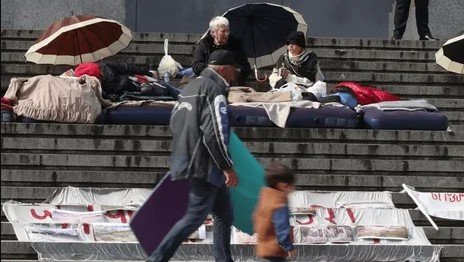European Union’s Deep Concern as Tensions in Georgia Escalate
Pawel Herczynski, the European Union’s Ambassador to Georgia, has voiced deep shock and dismay over the ongoing hunger strike of Mzia Amaglobeli, a middle-aged woman from Batumi, who has been in pre-trial detention for the past 16 days. Her detention stems from criminal charges, accusing her of assaulting a police officer—a claim that has sparked outrage given the broader context of violence and unaddressed abuse in Georgia.
Herczynski’s comments come at a critical time, as political tensions in Georgia continue to escalate. The EU Ambassador expressed concern not only for Amaglobeli’s well-being but also for the broader political crisis gripping the country. “This is unprecedented,” he stated in a recent press briefing. “We have witnessed brutal beatings on TV, where women were attacked by masked men, yet no one has been charged.”
A Disturbing Situation in Georgia
The situation surrounding Mzia Amaglobeli is emblematic of a wider pattern of unrest that has gripped Georgia. For the past two months, the streets of Tbilisi and other cities have been marked by violent protests, clashes with police, and mounting frustrations with the government. Herczynski described the events as “absolutely unacceptable,” adding that the lack of accountability from Georgian authorities is deeply troubling.

“Women being beaten by masked men, and no one being held accountable, speaks volumes about the state of justice here,” Herczynski noted, further emphasizing the hypocrisy of the legal system. “Meanwhile, a woman like Mzia Amaglobeli is in pre-trial detention for allegedly assaulting a police officer—this is where we are now.”
The Ambassador’s words echo concerns from several human rights groups and political analysts who have been raising alarms about the erosion of judicial integrity and the growing use of excessive force by Georgian authorities. Herczynski’s shock at Amaglobeli’s hunger strike underscores the gravity of the situation, with the EU carefully watching how the Georgian government will respond.
EU’s Efforts to Address the Crisis
Herczynski made it clear that the European Union is not turning a blind eye to these developments. “We really want Georgia to succeed, but what we are seeing now is a clear sign of a deep political crisis,” he said. The EU has been actively discussing potential sanctions, but Herczynski noted that achieving unanimity among EU member states has been challenging. Some member countries have been reluctant to join in the imposition of sanctions, which complicates efforts to hold Georgian authorities accountable.
Despite the challenges, Herczynski remains hopeful that the EU’s leadership will persist in pushing for a coordinated response. “There are still member states who do not want to join unanimity, but knowing the dedication of EU leadership, we will try,” he assured the press.
The ongoing debate around sanctions highlights the complex relationship between Georgia and the European Union. While Georgia aspires to closer ties with the EU, the political and human rights situation in the country poses significant obstacles.
A Call for Accountability
The case of Mzia Amaglobeli has come to symbolize the broader frustration felt by many Georgians. Herczynski called out the ongoing violence, intimidation, and disproportionate use of force by authorities. He also urged the government to take responsibility for finding a way out of the political deadlock. “There is a need to find a way out of the current deep political crisis,” he said, adding that the Georgian authorities have a “responsibility to actively look for such a way out.”
One of the most distressing aspects of the situation, according to Herczynski, is the erosion of trust in the Georgian judicial system. The cases of police brutality, including those involving journalists and politicians, have deepened the public’s skepticism about the rule of law in the country. Herczynski specifically pointed out the failure to bring those responsible for the violence to justice.
International Pressure Mounts
As Georgia faces growing international scrutiny, the EU is not alone in its concern. The U.S. Embassy in Tbilisi and several international human rights organizations have also condemned the actions of Georgian authorities. The situation is attracting more and more global attention, and there is increasing pressure for accountability and reform.
Herczynski’s remarks reflect a broader concern about the direction in which Georgia is headed. With mounting tensions and the continued lack of accountability for violence and police brutality, the EU’s response could play a significant role in shaping the future of Georgian politics.
